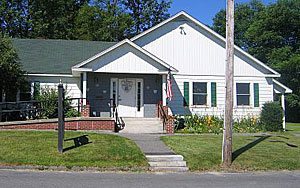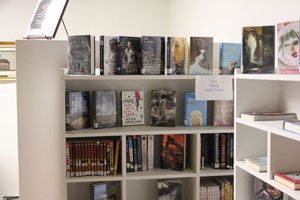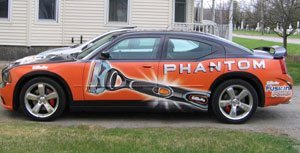The books that most delight middle school and junior high readers often straddle a “Middle Kingdom” ranging from upper middle grade to YA. Each month, Bookology columnist Lisa Bullard will visit the Middle Kingdom by viewing it through the eyes of a teacher or librarian. Bookology is delighted to celebrate the work of these educators who have built vital book encampments in the transitional territory of early adolescence.
This month’s journey takes us to the Hartland Public Library in rural Maine, where Lisa talks with librarian John R. Clark.
Lisa: What are three to five things Bookology readers should know about your community or library?

John: Hartland is very rural, economically depressed, and isn’t close to any city with a bookstore. That means the library assumes a much larger role in terms of offering access to juvenile fiction than a city like Portland or Boston. We’ve tried to address this in creative ways, like swapping books online at PaperBack Swap, using revenue from books sold online to add to the collection, and trading with other librarians in Maine when we get recent duplicates. Maine is big in size, but very close in terms of library coöperation. It helps immensely that we have a statewide interlibrary loan van service. That makes encouraging younger patrons to feel comfortable using interlibrary loan an easy process.
Lisa: I’ve heard that you’re retiring, so I have a couple of connected questions I really hope you’ll address given your valuable in-depth perspective: How have books for middle kingdom readers changed during your tenure in the library? And have the types of books that readers this age ask for changed in any key way?

John: There has been a major shift in both juvenile and young adult fiction, particularly in the past few years. I attribute this to two things. First, J.K. Rowling stood the publishing industry on its ear and suddenly everyone realized that there was one heck of a market for books that involved fantasy and kids who weren’t ‘average.’ The second was 9⁄11. I don’t think adults (except for writers and librarians, maybe) had a clue how scary that made the world for everyone. Escape into books became a very healthy and popular part of life. In the past few years, we have seen a second wave begin, that of addressing all sorts of social/mental health/family issues in literature. This is more pronounced in young adult, but things like divorce, gay parents, sibling loss, and bullying are being addressed, very excellently I might add, in juvenile literature. In fact, one of my blogs at Maine Crime Writers recently was about this phenomenon, which I think is a hip version of what we used to call bibliotherapy when I worked in the mental health field. Kids have responded very well to these books and I read them myself because I enjoy seeing how different authors address the topics. Juvenile readers have responded to these new topics and I often see them come in and ask specifically for a book a friend read that they think will be interesting because of something going on in their life.
Lisa: What five books (or series) are checked out most often by readers in the Middle Kingdom age range?
John:
- anything by Rick Riordan
- anything by John Flanagan
- the Saranormal series by Phoebe Rivers
- Anybody Shining by Frances O’Roark Dowell
- The Question of Miracles by Elana K. Arnold
Lisa: What book(s) do you personally love to place into middle school readers’ hands?
John:
- Half a Chance by Cynthia Lord
- A Hitch at the Fairmont by Jim Averbeck
- The Secrets of Tree Taylor by Dandi Daley Mackall
- A Million Miles from Boston by Karen Day
- The Junction of Sunshine and Lucky by Holly Schindler
- Sizzle by Lee McClain
- Counting by 7s by Holly Goldberg Sloan
- Lost Boy by Tim Green
Lisa: If you had a new staffer starting tomorrow, what piece of advice would you be sure to give them about working with readers in this transitional age?
John: That’s easy, read in the genre if at all possible because you can’t beat real, firsthand experience when it comes to talking about books with teens and tweens.
Lisa: What do you like most about working with middle-schoolers?
John: They’re really excited when they realize you understand their interests and treat them as intelligent human beings. It’s doubly rewarding when they come in waving the book you suggested and say, “You rock! What else should I read?”
Lisa: Could you share some information about your most popular/successful/innovative program for promoting books and reading?

John: Several years ago, I won a street-legal version of Kasey Kahne’s Dodge from Gillette. It included a trip to meet Kasey at the Citizen’s Bank 400 in Michigan. The staff of the promotion company was really interested in my summer giveaway program for kids who read. They got various NASCAR drivers and teams to send me a ton of posters, shirts, and banners to use as reading incentives. I added in a bunch of stuff like MP3 players and new DVDs we’d gotten for Pepsi points and we gave away over $1,000 worth of prizes for a combined reading and writing program. Kids were beyond thrilled.
[Clark-John‑R]

John — Been reading about you and it’s always a pleasure. Hope you enjoy retirement but I suspect the rocking chair won’t get much use. You’re a hundred-mile-an-hour guy. Hope to stay current.
Bill Sullivan, Bangor